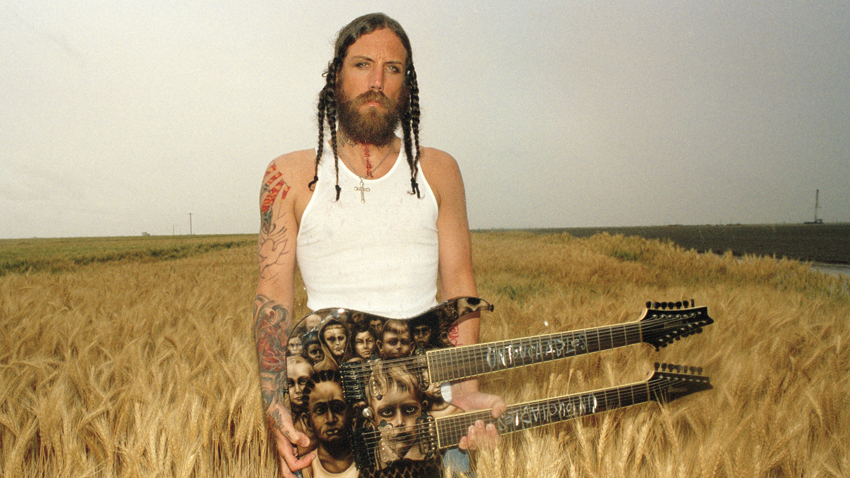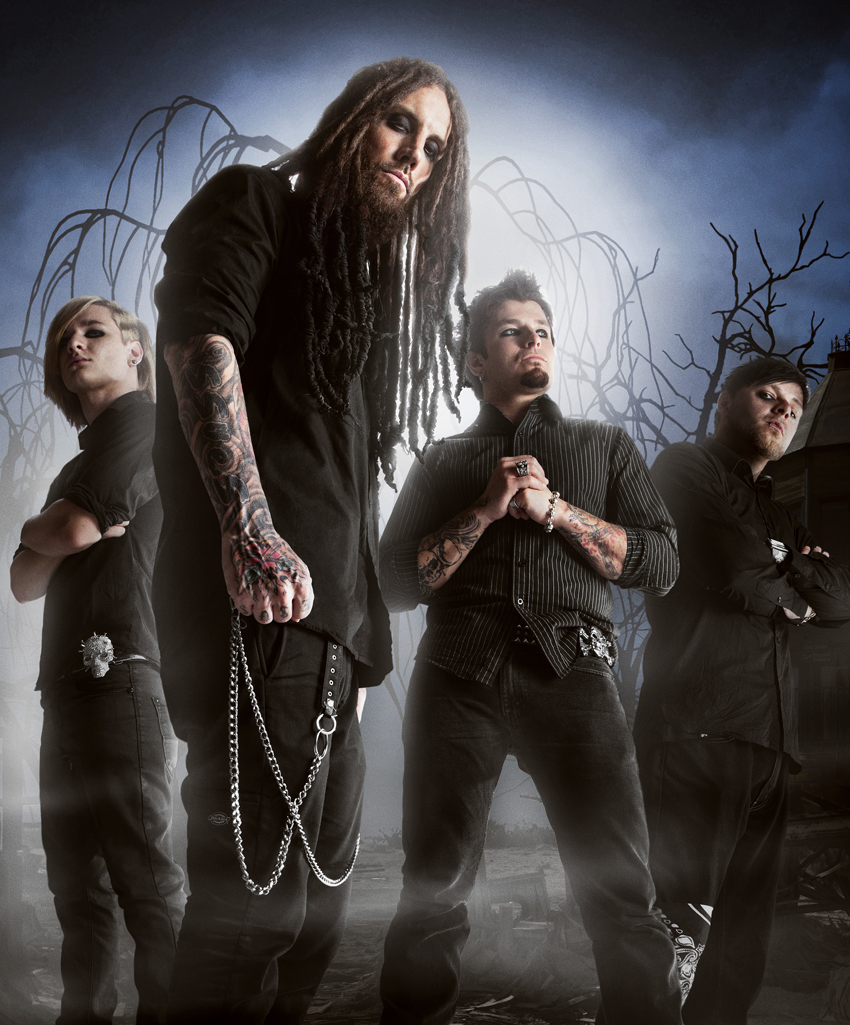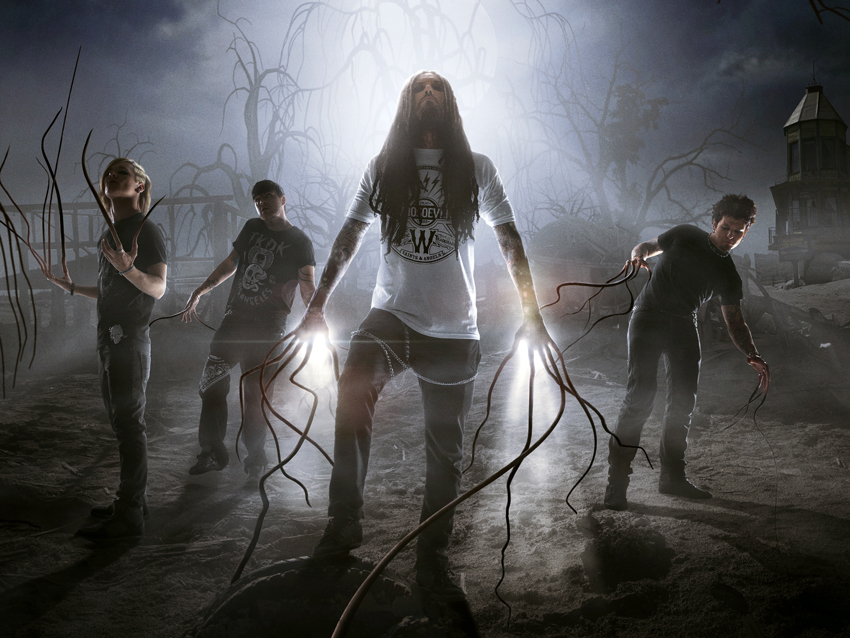
"I wanted to have a more band effort for my music," says singer and guitarist Brian "Head Welch. "Since leaving Korn, I really missed being part of something. I like the idea of everybody writing and pulling together. This new band feels like the right vehicle for what I'm doing."
Welch's guitar style, once famously matched with his ex-Korn mate James "Munky" Shaffer, shrieking and rumbling, performed on detuned seven-string guitars, was one of the hallmarks of the mid-'90s nu metal aesthetic. "We created an amazing sound," says Welch. "A lot of guitarists try to establish something that's recognizable, and I'm proud that we put something out there that was ours."
In 2005, Welch, burned out on drugs and seeking to make sense of what he calls an "out-of-control lifestyle," left Korn. He converted to Christianity, wrote a well-received book, Save Me From Myself: How I Quit Korn, Kicked Drugs, And Lived To Tell My Story, and issued a solo album with the shorter title Save Me From Myself. All along, though, Welch was pining to have a working band again, and following a 2011 tour he put together Love And Death, which includes Dan Johnson on drums, Michael Valentine on bass and 17-year-old guitarist J.R. Bareis.
Love And Death's debut album, Between Here & Lost, has just been released, and so we sat down with Welch to talk about how the group came together, what it's like to play with a teenager, how his spiritual life keeps him on the straight-edge tip and where things stand with him and his onetime Korn pals.
You toured with a couple of the members of Love And Death before the band actually formed. Did you have an idea that they would work out full-time?
"Well, I was impressed by their dedication. When I put my solo album out, I put a band together for touring, and a few of the guys stuck around - Dan and Valentine. It wasn't a glamorous tour - it was pretty much us in a van - so the guys who lasted I could tell were very committed."
Talk to me about working with J.R. Were you looking to form a relationship with him that mirrored your partnership with Munky?
Want all the hottest music and gear news, reviews, deals, features and more, direct to your inbox? Sign up here.
"I was looking for somebody with a fresh approach, a guy who could come at me with some new ideas and blow me away. I think I found that with a 15-year-old kid! [Laughs] Actually, when he joined the band he turned 16 a month later. To be honest, he was my only choice. One of the guys quit before a tour, and I needed a guitar player fast. J.R. was the only person around who could do it.
"Which isn't to say I took him 'cause I had to. He looks 22 or 23, and he plays really tight. I could tell he had great stage presence - the whole thing. I was a bit put off by his age, and my manager was like, 'No way. He's a liability.' But we managed to make it all happen. I worked things out with J.R.'s parents to have legal guardianship of him on the tour."

Love And Death are (left to right) J.R. Bareis, Welch, Dan Johnson and Michael Valentine. © Caleb Kuhl
Well, I guess his folks don't have to worry about drugs and alcohol on the road. You're past all of that.
"That's right. None of that at all. It's funny - his parents felt this was coming. They put him in an online school because he was getting so good on the guitar. I think they knew where he was headed."
Is it weird for you to deal with somebody so young in the band? Not that you're ancient, but there is a big age difference. He's a kid!
"Yeah. Sometimes you can see he's a kid, but other times the older guys act younger than him. It's strange. He'll say 'What?' to me like all teenagers do. Even if they hear you, they'll be like, 'Whhhhud?' [Laughs] As far as other things go, he's very mature and has his emotions under control. He's pretty interesting."
What was this 'fresh approach' you were looking for in another guitarist? What does J.R. do that other players don't?
"It's more what he doesn't do - the riffs and licks you've heard before. When he joined the band, I told him I wanted him to write, and he said, 'I don't write. I just play.' And I said, 'You play so well, man, I can't believe you can't write riffs. Go home and start writing some.' He looked at me and said, 'Okayyyy.' [Laughs]
"He came up with great stuff. It took a while - the producer of the record, Jasen Rauch, and I had to go through a bunch of his ideas. Eventually, he had some slamming riffs. I couldn't believe how amazing the riff to The Abandoning was. I never would have written something like that. You don't want somebody in the band, especially a guitar player, who is just going to do what you do."
What made you decide to record in Nashville?
"It's just where the spirit took me, I guess. Mainly, I got some new managers who are based in Nashville. I was in Arizona for five years, and I just wanted to get out of there. It was time to move on. I had some baggage in Arizona, and I needed somewhere fresh. Nashville was everything I was looking for.
It's like Little LA now - musicians and rock bands everywhere. I love it. Just at the airport, I ran into all of these people I knew. The Fray live in Nashville, and then you've got Kings Of Leon and a few others. It's not just a country music place anymore; there's a bunch of rock-oriented writers there now. I've connected with them, and a few of them are co-writers on the album."
You mentioned the song The Abandoning. It does have a bit of a Korn vibe to it. Do you hear that?
"I think most songs are just verse, pre-chorus, chorus, bridge and all that. I guess there might be something of a Korn sound or approach to it - that's what I came up playing."
But have there been times, when laying down guitar parts, where you said, "That sounds like Korn. Better not do that"?
"Yeah, sometimes. But the producer on this record wanted me to sound like me. I can only sound one way. There have been times where things sounded a little too Korn-y [laughs], and we might have made a change here or there. I'm pretty open-minded to what people say to me."
Talk to me about the song Chemicals. I'm assuming it's autobiographical.
"I wrote that with the bass player and producer back in 2011. We were frustrated because we couldn't write at the studio, but on my way home I heard the riff in my head. I came back the next day, wrote that, and there you go.
"Lyrically, I can address that topic pretty easily. It's been a while now, and I don't have those itchy feelings anymore. That person I was who was into drugs, that's a whole different guy; it's a lifetime away. It's only been a few years, but I feel as though that old person died."
How long have you been clean?
"Eight years. I do it on my own. The spiritual life is what enables me to live. That's why people become addicted, because they don't have a spiritual life; they're trying to fill that hole somehow. I'm totally full now - I don't have to go anywhere else or use anything to be complete. It's pretty rad."
Do you find that some of your early fans still have a problem reconciling the music you play with your embrace of Christianity?
"I do. I think it's taking people a while, and some still haven't come to terms with it. I don't sell anywhere near what Korn sells, so a lot of people haven't figured it out. Slowly but surely, they are. But I'm just having fun doing what I'm doing. This record has everything I want in music: heaviness, darkness and melody. We even go in major keys - I've never done that before. I'm a pretty happy guy."
I Wait For You has a lot of electronics in it. That's pretty different for you.
"It is, sure. But it's got the heaviness that I like. It's got everything. We have the guest vocalist, Mattie from For Today, and he has the voice of thunder. He just kills it. It's one of my favorites because it has so much energy. The electronics are all samples and programming that the producer did. He's a master at that stuff. I don't even know how it all works." [Laughs]

Welch and Love And Death recorded their debut in Nashville. "A very inspiring town," he says. "It's got a lot of rock going on." © Caleb Kuhl
Your cover of Devo's Whip It is more of a re-imagining of the song. How did that come about?
"That's a good way of putting it. Thank you! [Laughs] My manager played me the cover of Burning Down The House by the band The Used, and I really liked it. I started thinking of a new wave cover to do, and I came up with Whip It. I didn't know if I could do it because it was just so, like… stupid [laughs]. Usually cover tunes sound just like the originals. But then I thought of just doing the half-time of the riff, and that was the right way to go. Before I did that, the producer was like, 'No way. It's too stupid.' But when he heard my idea, he said, 'Yeah, that could work…' It came out great."
What kinds of guitars are using nowadays? Are you still playing the seven-string Ibanezes?
"I'm playing Ibanez six-string baritones. I play them tuned down to A-flat. It's the perfect tuning. The other guitar player uses Paul Reed Smiths. I got off the seven-string guitars because they felt too normal to me; I wanted a different approach. I come up with different chord progressions with the six-strings. It's a new way of working, and it pushes me into new areas. The sound is thicker and richer."
What do you miss about being in Korn? I assume you don't think back to just the bad times.
"I miss my friends, and I miss the fans. We were people who were into the same stuff for years. The bad memories tend to go away. And, of course, I've played with them recently…"
I was going to ask you about that.
"It was great. I played one song, Blind, with them last year at the Carolina Rebellion in front of 50,000 people. I went to the festival with my daughter - she likes Evanescence and Staind and all of these bands; she's a little rocker. So Korn were playing, and I was just looking forward to seeing the show.
"They asked me to jam with them, which took me by surprise, but I thought, Why not? Everybody was watching - all of these bands, like Five Finger death Punch - and it was surreal. The singer was crying - all of these good memories... So they asked me to play two shows with them this year. Initially, I said, 'Thank you, but no,' but then I thought about it and said sure. So we're going to do some shows, which will be great. It's the right time. The whole thing came out of nowhere."
Have you rebuilt your relationship with them, or was that gig the start?
"That was the start. I'm rebuilding it right now. We're in contact, Munky and I are talking, and it's cool. Everybody's very positive. I'm happy where things are."
Joe is a freelance journalist who has, over the past few decades, interviewed hundreds of guitarists for Guitar World, Guitar Player, MusicRadar and Classic Rock. He is also a former editor of Guitar World, contributing writer for Guitar Aficionado and VP of A&R for Island Records. He’s an enthusiastic guitarist, but he’s nowhere near the likes of the people he interviews. Surprisingly, his skills are more suited to the drums. If you need a drummer for your Beatles tribute band, look him up.
